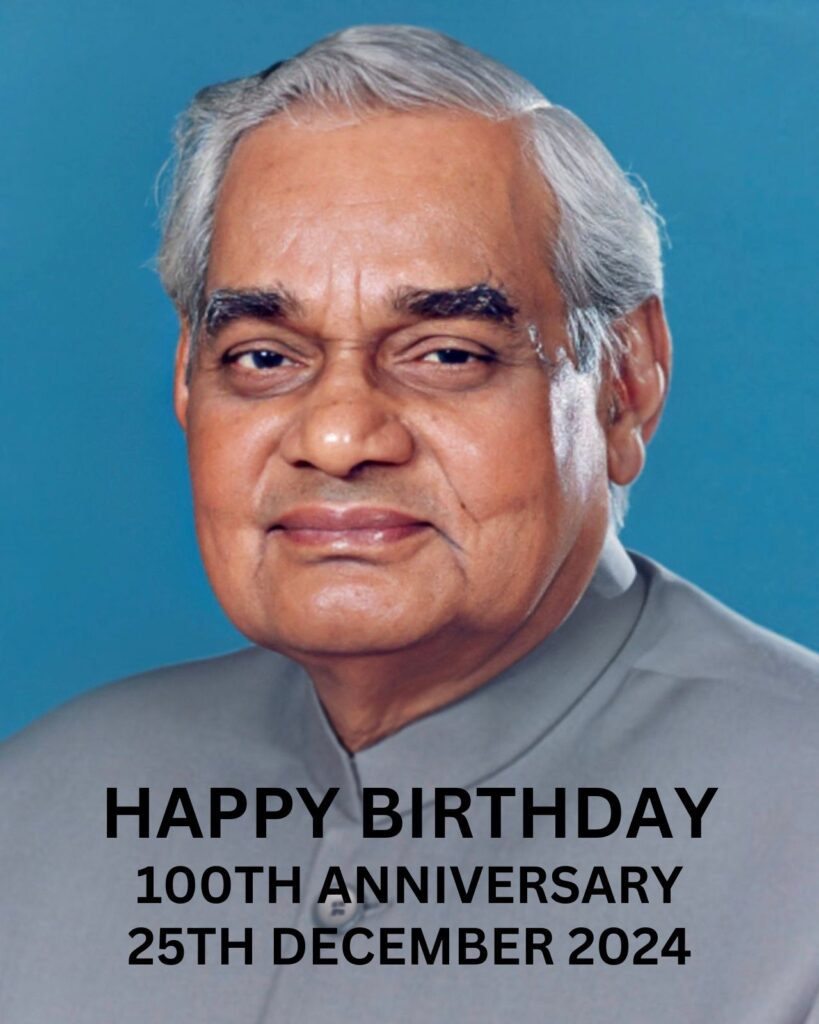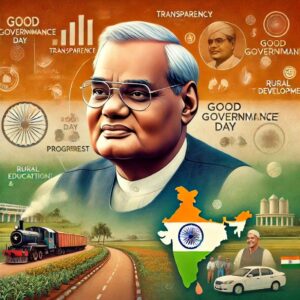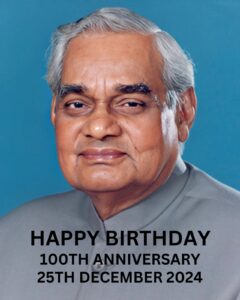Atal Bihari Vajpayee: A Visionary Leader and Poet-Statesman

Born: December 25, 1924, Gwalior, Madhya Pradesh
Died: August 16, 2018, New Delhi
December 25, 2024, marks the 100th birth anniversary of Atal Bihari Vajpayee, one of India’s most beloved leaders and a towering figure in the nation’s political and cultural landscape. A statesman, poet, and visionary, Vajpayee’s legacy continues to inspire millions of Indians. His life and achievements epitomize dedication, resilience, and a deep commitment to India’s progress. On this milestone anniversary, it is fitting to reflect on his remarkable journey and enduring contributions.
Early Life and Education
Atal Bihari Vajpayee was born on December 25, 1924, in Gwalior, Madhya Pradesh, into a humble family. His father, Krishna Bihari Vajpayee, was a school teacher and a poet, a trait that influenced young Atal profoundly. Vajpayee’s early education took place in Gwalior, where he excelled as a student and showed a keen interest in literature and debates. He later pursued higher education at Victoria College (now Laxmibai College) in Gwalior and completed his post-graduation in Political Science from DAV College, Kanpur.
From an early age, Vajpayee displayed an inclination toward public service and leadership. Inspired by the ideals of nationalism, he joined the Rashtriya Swayamsevak Sangh (RSS) in 1939. This association with the RSS laid the foundation for his lifelong commitment to nation-building.
Entry into Politics
Vajpayee’s political journey began with his involvement in the Bharatiya Jana Sangh (BJS), the precursor to the Bharatiya Janata Party (BJP). In 1951, he joined the BJS under the mentorship of Syama Prasad Mookerjee, who recognized his oratory skills and political acumen. Vajpayee quickly rose through the ranks, becoming the face of the party in Parliament. His eloquent speeches and ability to connect with people from all walks of life earned him widespread admiration.
In 1957, Vajpayee was elected to the Lok Sabha for the first time from Balrampur, Uttar Pradesh. His maiden speech in Parliament left an indelible impression on then-Prime Minister Jawaharlal Nehru, who predicted that Vajpayee would one day lead the country. This prediction came true decades later.
The Rise of the Bharatiya Janata Party
After the dissolution of the Jana Sangh during the Emergency (1975–1977), Vajpayee played a pivotal role in the formation of the Janata Party and later, the Bharatiya Janata Party (BJP) in 1980. He became the BJP’s first president, envisioning it as a party rooted in India’s cultural ethos and committed to democratic values. His leadership and moderate approach helped the BJP gain traction across the country.
Prime Ministerial Tenures
Vajpayee served as India’s Prime Minister three times: briefly in 1996, from 1998 to 1999, and then from 1999 to 2004. His tenure is remembered for groundbreaking initiatives, pragmatic policies, and efforts to strengthen India’s position on the global stage.
1. Pokhran-II Nuclear Tests
One of Vajpayee’s most significant achievements was conducting the Pokhran-II nuclear tests in 1998. Despite international pressure and the risk of sanctions, Vajpayee’s government demonstrated India’s scientific and strategic capabilities. These tests marked India’s arrival as a nuclear power and bolstered its national security.
2. Infrastructure Development
Vajpayee’s tenure saw a focus on infrastructure development, most notably the launch of the Golden Quadrilateral project. This ambitious initiative aimed to connect India’s major cities through a network of highways, boosting economic growth and regional connectivity.
3. Economic Reforms
As Prime Minister, Vajpayee implemented economic reforms to liberalize the economy, attract foreign investment, and foster industrial growth. His government’s policies laid the groundwork for India’s economic resurgence in the 21st century.
4. Efforts for Peace
Vajpayee was a staunch advocate of peace and diplomacy. In 1999, he undertook the historic Lahore Bus Yatra to improve relations with Pakistan. Although the subsequent Kargil War tested his resolve, Vajpayee’s commitment to dialogue and peaceful coexistence remained unwavering.
5. Kargil War Victory
During the Kargil War of 1999, Vajpayee’s leadership was instrumental in rallying the nation and ensuring a decisive victory. His government’s handling of the conflict earned widespread respect, both domestically and internationally.
The Poet and Orator
Beyond politics, Atal Bihari Vajpayee was a gifted poet and a master orator. His poetry, infused with patriotism and philosophical depth, resonated with millions. Poems like “Maut Se Than Gayi” reflect his indomitable spirit and belief in facing challenges with courage. His speeches, marked by wit, wisdom, and eloquence, transcended political boundaries and earned him admiration across party lines.
Awards and Recognition
Atal Bihari Vajpayee’s contributions to India’s progress and his exemplary leadership were recognized with numerous awards and honors. In 2015, he was conferred the Bharat Ratna, India’s highest civilian award. December 25, his birthday, was declared Good Governance Day in his honor.
Legacy and Impact
Vajpayee’s legacy extends far beyond his political achievements. He embodied the ideals of consensus-building, moderation, and inclusivity. As a leader, he prioritized the nation’s interests above partisan politics, earning respect from allies and opponents alike. His vision for a self-reliant, prosperous, and harmonious India continues to guide policymakers.
Final Years and Passing
After retiring from active politics in 2009 due to health issues, Vajpayee spent his final years away from the public eye. On August 16, 2018, he passed away in New Delhi, leaving the nation in mourning. His funeral was attended by leaders from across the political spectrum, reflecting the immense respect he commanded.
Conclusion
As India celebrates Atal Bihari Vajpayee’s 100th birth anniversary, his life serves as a beacon of inspiration. A statesman par excellence, a visionary leader, and a compassionate human being, Vajpayee’s legacy is a testament to the transformative power of dedication and integrity. His contributions to India’s political, economic, and cultural landscape remain unparalleled, ensuring that his memory will be cherished for generations to come.






